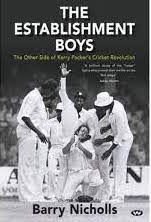The Establishment Boys
Archie Mac |Published: 2021
Pages: 273
Author: Nicholls, Barry
Publisher: Wakefield Press
Rating: 4 stars

It was huge back in the day. The best players from around the world were bought by Kerry Packers’ World Series Cricket (WSC). The biggest impact was to the Australian team with the vast majority of the best two dozen players defecting.
As Author Barry Nicholls points out, the victors tend to write history. So, most who know their cricket will be familiar with WSC through a number of books, a miniseries and the commentary from those involved, who were all Packer men. Richie Benaud and Ian Chappell in particular commented extensively on the quality of the cricket played during WSC and the class of the combatants involved. What you didn’t hear from the ‘victors’ was about those who replaced the WSC Australian players.
The Establishment Boys focuses on those who stepped into the breach when the WSC players were banned by the Australian Cricket Board (ACB). The players took great pride in their performances and were proud to represent their country no matter the circumstances of their selection.
Nicholls writes with respect for his subjects and appears to have drawn out some honest answers from the players he interviewed. A regular theme was the lack of support from the ACB and the unrelenting pressure from the press.
For instance, Graham Yallop who captained in the 1978/79 season, had to organise everything from practice, to the laundry collection to taxis to transport the team to the Test matches. The press also never let Yallop forget his quip at the start of the Ashes series that Australia would win six nil. In the end the Aussies lost by five Tests to one.
Nicholls introduces each new player as they are selected to play for Australia, providing a brief synopsis of their journey to Test cricket. The selectors don’t make it easy for him with sometimes three or four new players picked from Test to Test. Pick and stick was certainly not the theme of the ACB selectors during the WSC years.
The author highlights some of the difficulties in the relations between selectors and players at the time, especially the lack of communication. Players often seem to find out about their selection, or worse axing, from journalists, family or even people at work.
Wayne Clark, who was Australia’s most successful bowler against India, was surprisingly left out of the Ashes series the following summer. A journalist told him it was because his action was considered dubious and there was a gentlemen’s agreement between England and Australia that no one with a suspect action would be chosen for the Ashes. Clark’s attempts to obtain clarity from the ACB fell on deaf ears. Sure enough, after not featuring in the Ashes series, Clark was brought back for the two Test series against Pakistan later that summer.
Ian Callen was another story of mismanagement. Selected to make his debut for his country he was also included in the team for an upcoming tour of the West Indies. The day before his first Test, Callen was unbelievably sent for five inoculation injections in preparation for the West Indies tour. Callen had a reaction to the jab for yellow fever and failed to do himself justice in his first Test match.
Nicholls concludes his book with a ‘where are they now?’ chapter. Again, Nicholls solicits some honest responses from those he interviewed. Almost all of whom mention the lack of support from the ACB and their feelings of being discarded once the WSC players were again available for selection. It was interesting to see that a couple of the players did very well for themselves post cricket, although there were also a couple of melancholy stories too.
The Establishment Boys, is a fine read and admirably fills a gap in cricket literature. It is also well written and an entertaining story that is a pleasure to peruse. Highly recommended, with a RRP of AU $34.95







Leave a comment